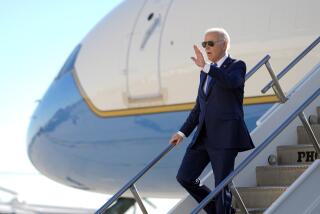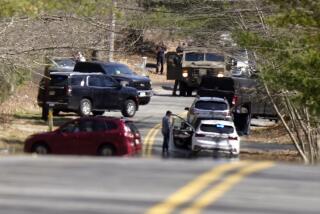U.S. Probing Its Role in Iraq’s Supergun
- Share via
WASHINGTON — The Pentagon has begun an internal review to determine how notorious artillery designer Gerald Bull obtained a U.S. export license for computers used in the design of Iraq’s supergun, sources said Wednesday.
The inquiry, following disclosure of the technology transfer this week, is at least the fifth government investigation launched in recent months into aspects of the Bush Administration’s assistance to Iraq before the Persian Gulf War.
Earlier this week, The Times and other publications reported that one of Bull’s firms received the export license in September, 1989, for computers that it said were to be used in the country’s automotive factory but ultimately helped design the supergun as well as an Iraqi ballistic missile and self-propelled howitzers.
Although the supergun was never used by Iraq, it had the potential to fire nuclear, chemical and biological warheads.
The Pentagon did not object to the license despite the potential military applications of the computers and related software and Bull’s past conviction for export violations. The license also was cleared by the Bush Administration committee that monitors exports with nuclear applications.
The Pentagon review and parallel investigations mean that fallout from the Administration’s highly criticized pro-Iraq policy before the war will continue well beyond the presidential election.
Confronted again Wednesday with questions about his dealings with Iraqi leader Saddam Hussein, President Bush lashed out at critics and offered his most extended defense yet of his policy.
“We did try to bring him (Hussein) into the family of nations and now I see all these hearings distorting the policy,” Bush said in response to a caller on ABC-TV’s “Good Morning America.”
Bush charged that Democrats in Congress who opposed the Gulf War and “bleeding hearts in the media” are trying to “tear down” the allied victory by contending wrongly that prewar U.S. policy helped build the Iraqi military.
“We had a policy to screen to be sure that key elements did not go for nuclear weapons or for arms,” said Bush. “Now, if a Tandy computer or an IBM personal computer ends up somewhere in a nuclear program, too bad. But the policy was not to do that.”
The former head of the U.N. inspection teams in Iraq and other witnesses testified at a Senate hearing Tuesday that U.S. technology played a substantial role in Iraq’s weapons programs.
In 1989, Bull’s Maryland company applied for a license to sell two computers to Iraq, saying in the application that they were destined for the country’s state automotive factory.
The application was referred to the Subcommittee on Nuclear Export Coordination, the interagency group that monitors nuclear-related exports.
The group recommended approving the exports, despite Bull’s 1980 conviction for selling arms to South Africa and concerns that he was working on Iraqi military projects in 1989, according to records.
The group is chaired by the State Department, which defended the action Wednesday. In a statement, department officials said it was determined that the computers would not make a significant contribution to Iraq’s nuclear activities, even if they were diverted to military use.
Bull was murdered in Brussels in March, 1990, possibly for his work on behalf of Iraq. After the war, U.N. inspectors in Iraq found and destroyed a prototype of Bull’s supergun.
Derek J. Vander Schaaf, deputy inspector general at the Pentagon, said that there was no internal investigation of the Bull license. However, a senior official said that a review had been launched to determine how the department let the license go through without objection.
Far more serious than the Pentagon’s review are at least two Justice Department criminal investigations related to Iraq policy issues.
One is a wide-ranging inquiry led by a retired federal judge appointed as a special investigator by Atty. Gen. William P. Barr in response to congressional pressure. He is examining allegations that U.S. food aid to Iraq was traded for arms and is trying to determine whether laws were broken when a federal judge in Atlanta received misleading CIA information.
A separate criminal inquiry centers on the removal of military designations for items on a list of 771 Iraqi exports sent to Congress in late 1990 by the Commerce Department.
The Customs Service is investigating whether export laws were violated in connection with shipments of U.S. technology to Iraq.
The Commerce Department is conducting an inquiry into an undisclosed number of U.S. exports to Iraq that may have been diverted to weapons programs, including an electron-beam welder used to help produce bomb-grade uranium.
More to Read
Sign up for Essential California
The most important California stories and recommendations in your inbox every morning.
You may occasionally receive promotional content from the Los Angeles Times.










